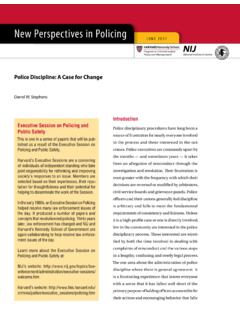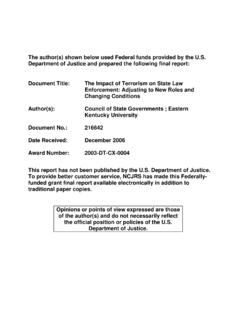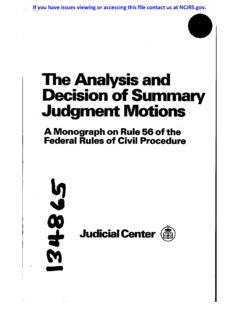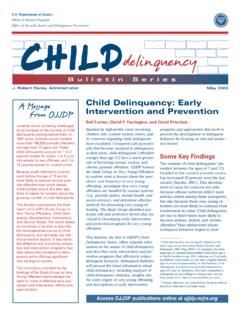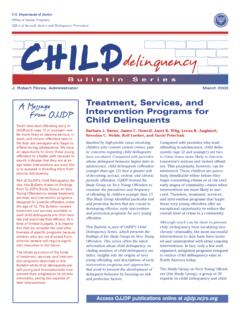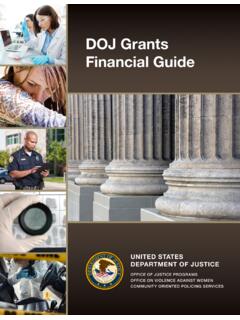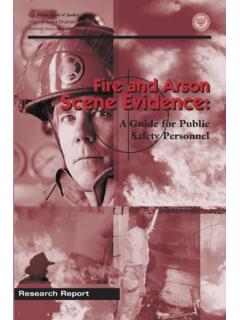Transcription of Collateral Consequences of Criminal Convictions Judicial ...
1 The author(s) shown below used Federal funding provided by the Department of Justice to prepare the following resource: Document Title: Collateral Consequences of Criminal Convictions : Judicial Bench Book Author(s): American Bar Association Document Number: 251583. Date Received: March 2018. Award Number: 2015-R2-CX-0048. This resource has not been published by the Department of Justice. This resource is being made publically available through the Office of Justice Programs' National Criminal Justice Reference Service. Opinions or points of view expressed are those of the author(s) and do not necessarily reflect the official position or policies of the Department of Justice.
2 Collateral Consequences of Criminal Convictions Judicial Bench Book The National Inventory of Collateral Consequences of Criminal Convictions This resource was prepared by the author(s) using Federal funds provided by the Department of Justice. Opinions or points of view expressed are those of the author(s) and do not necessarily reflect the official position or policies of the Department of Justice. Introduction Why a Bench Book? It is clear that many judges, prosecutors and defense lawyers in many jurisdictions have paid scant attention to the effects that Collateral Consequences of conviction might have on individuals convicted of crimes.
3 It is easy to know how much jail or prison time a judge imposes, how long a probation period is set, and the amount of a fine or restitution. But it has been difficult for everyone involved in Criminal cases to determine what the other Consequences of a conviction are Consequences that are fixed by force of law. The National Inventory of Collateral Consequences of Conviction (NICCC) now makes accessible to judges, prosecutors, defense counsel, defendants, victims, and the general public the sanctions and disqualifications that flow from a Criminal conviction and that are not part of the actual judgment that is filed in a Criminal case.
4 Under a generous grant from the Department of Justice National Institute of Justice (NIJ), the American Bar Association (ABA) has developed the National Inventory of Collateral Consequences of Conviction, a free, online database that attempts to identify each and every Collateral Consequences of conviction contained in every jurisdiction's laws and regulations, including the Code and Code of Federal Regulations. The website is accessible at The website identifies approximately 45,000 Collateral Consequences and is organized by category of right or benefit, manner of imposition, duration, and triggering offenses. The search features can assist any user to begin identifying relevant Collateral Consequences for a particular circumstance and situation.
5 This project was supported by Award Number 2015-R2-CX-0048 awarded by the National Institute of Justice, Office of Justice Programs, Department of Justice. The points of view of this document are those of the author and do not necessarily represent the official position or policies of the Department of Justice. 2. This resource was prepared by the author(s) using Federal funds provided by the Department of Justice. Opinions or points of view expressed are those of the author(s) and do not necessarily reflect the official position or policies of the Department of Justice. The opening page of the website looks like this: The user clicks on the orange V, clicks a box on a disclaimer page and discovers the map of the United States and an invitation to pick a state that is relevant: Judges who are familiar with the NICCC are now able to ask a defense lawyer whose client is prepared to plead guilty whether the lawyer has consulted the NICCC and reviewed likely or certain Collateral Consequences with the defendant.
6 Judges are also able to examine the NICCC for themselves if they are 3. This resource was prepared by the author(s) using Federal funds provided by the Department of Justice. Opinions or points of view expressed are those of the author(s) and do not necessarily reflect the official position or policies of the Department of Justice. uncertain whether a defendant is fully aware of the impact of a plea. Judges may also encourage prosecutors and defense counsel to discuss Collateral Consequences during the course of plea bargaining. Examples of how one can use the NICCC are found below. The Seriousness of Collateral Consequences Collateral Consequences are legal disabilities imposed by law as a result of a Criminal conviction regardless of whether a convicted individual serves any time These Consequences create social and economic barriers for individuals reentering into society by denying or restricting benefits otherwise available to all Americans.
7 Collateral Consequences are known to adversely affect adoptions, housing, welfare, immigration, employment, professional licensure, property rights, mobility, and other opportunities the collective effect of which increases recidivism and undermines meaningful reentry of the convicted for a Moreover, Collateral Consequences disproportionately affect minority and economically disadvantaged Despite the sweeping adverse Consequences flowing from Collateral Consequences , defendants are generally not entitled, as a matter of due process, to be warned of these Consequences , either before accepting a plea or upon conviction.
8 Although the Supreme Court has required consideration of certain immigration effects of a Criminal conviction, the Court left open what other disenfranchisements might rise to the level requiring constitutional protection. The negative impact of Collateral Consequences on a returning citizen's chances of successful re-entry into his or her community are clear and well documented: Consider barriers to employment: 87% of employers conduct background checks, and recent surveys indicate that most employers are unwilling to hire applicants who have served time in prison. Many states per se bar returning citizens from public employment.
9 No wonder, then, that approximately 60% of formerly incarcerated individuals remain unemployed one year 1. See Description, NATIONAL INVENTORY OF Collateral Consequences , (last accessed Apr. 7th, 2016). 2. See Michael Pinard, Reflections and Perspectives on Reentry and Collateral Consequences , 100 & CRIMINOLOGY 1213 (2010); CIVIL. PENALTIES, SOCIAL Consequences (Christopher Mele & Teresa Miller eds., 2005); Marlaina Freisthler & Mark A. Godsey, Going home to Stay: A Review of Collateral Consequences of Conviction, Post-Incarceration Employment, and Recidivism in Ohio, 36 U. TOL. L. REV. 532 (2005); Michael Pinard & Anthony C.
10 Thompson, Offender Reentry and the Collateral Consequences of Criminal Convictions : An Introduction, 30 REV. L. & SOC. CHANGE 585 (2005). 3. See generally Michael Pinard, Collateral Consequences of Criminal Convictions : Confronting Issues of Race and Dignity, 85 L. REV. 457 (2010); Margaret E. Finzen, Systems of Oppression: The Collateral Consequences of Incarceration and Their Effects on Black Communities, 12 GEO. J. ON POVERTY L. & POL'Y 299 (2005); Gabriel J. Chin, Race, the War on Drugs, and the Collateral Consequences of Criminal Conviction, 6 J. GENDER RACE & JUST. 253 (2002). 4. This resource was prepared by the author(s) using Federal funds provided by the Department of Justice.
